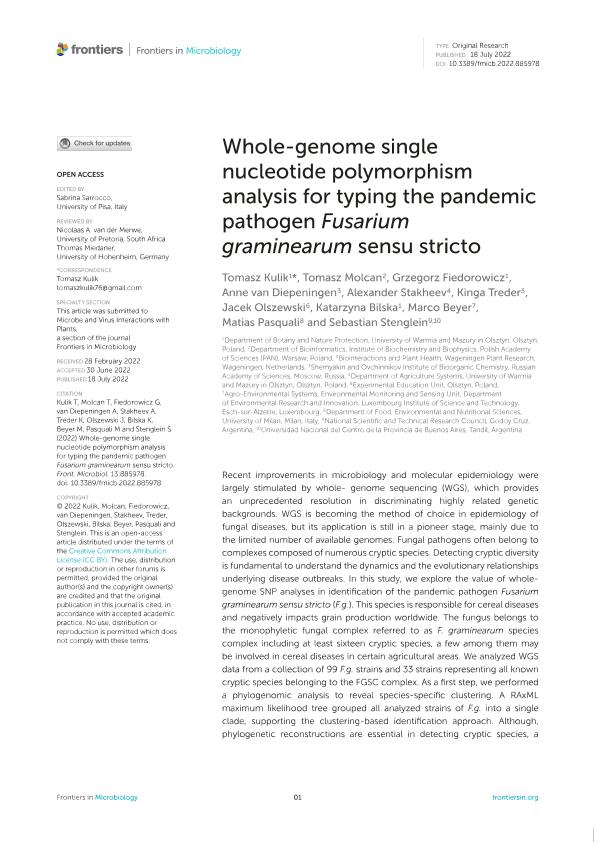Artículo
Whole-genome SNP analysis for typing the pandemic pathogen Fusarium graminearum sensu stricto
Kulik, Tomasz; Molcan, Tomasz; Fiedorowicz, Grzegorz; van Diepeningen, Anne; Stakheev, Alexander; Treder, Kinga; Olszewski, Jacek; Bilska, Katarzyna; Beyer, Marco; Pasquali, Matias; Stenglein, Sebastian Alberto

Fecha de publicación:
07/2022
Editorial:
Frontiers Media S.A.
Revista:
Frontiers in Microbiology
ISSN:
1664-302X
Idioma:
Inglés
Tipo de recurso:
Artículo publicado
Clasificación temática:
Resumen
Recent improvements in microbiology and molecular epidemiology were largely stimulated by whole- genome sequencing (WGS), which provides an unprecedented resolution in discriminating highly related genetic backgrounds. WGS is becoming the method of choice in epidemiology of fungal diseases, but its application is still in a pioneer stage, mainly due to the limited number of available genomes. Fungal pathogens often belong to complexes composed of numerous cryptic species. Detecting cryptic diversity is fundamental to understand the dynamics and the evolutionary relationships underlying disease outbreaks. In this study, we explore the value of whole-genome SNP analyses in identification of the pandemic pathogen Fusarium graminearum sensu stricto (F.g.). This species is responsible for cereal diseases and negatively impacts grain production worldwide. The fungus belongs to the monophyletic fungal complex referred to as F. graminearum species complex including at least sixteen cryptic species, a few among them may be involved in cereal diseases in certain agricultural areas. We analyzed WGS data from a collection of 99 F.g. strains and 33 strains representing all known cryptic species belonging to the FGSC complex. As a first step, we performed a phylogenomic analysis to reveal species-specific clustering. A RAxML maximum likelihood tree grouped all analyzed strains of F.g. into a single clade, supporting the clustering-based identification approach. Although, phylogenetic reconstructions are essential in detecting cryptic species, a phylogenomic tree does not fulfill the criteria for rapid and cost-effective approach for identification of fungi, due to the time-consuming nature of the analysis. As an alternative, analysis of WGS information by mapping sequence data from individual strains against reference genomes may provide useful markers for the rapid identification of fungi. We provide a robust framework for typing F.g. through the web-based PhaME workflow available at EDGE bioinformatics. The method was validated through multiple comparisons of assembly genomes to F.g. reference strain PH-1. We showed that the difference between intra- and interspecies variability was at least two times higher than intraspecific variation facilitating successful typing of F.g. This is the first study which employs WGS data for typing plant pathogenic fusaria.
Archivos asociados
Licencia
Identificadores
Colecciones
Articulos(INBIOTEC)
Articulos de INSTITUTO DE INV. EN BIODIVERSIDAD Y BIOTECNOLOGIA
Articulos de INSTITUTO DE INV. EN BIODIVERSIDAD Y BIOTECNOLOGIA
Citación
Kulik, Tomasz; Molcan, Tomasz; Fiedorowicz, Grzegorz; van Diepeningen, Anne; Stakheev, Alexander; et al.; Whole-genome SNP analysis for typing the pandemic pathogen Fusarium graminearum sensu stricto; Frontiers Media S.A.; Frontiers in Microbiology; 13; 7-2022; 1-9
Compartir
Altmétricas



